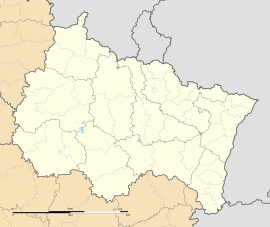Machy, Aube facts for kids
Quick facts for kids
Machy
|
|
|---|---|
| Country | France |
| Region | Grand Est |
| Department | Aube |
| Arrondissement | Troyes |
| Canton | Les Riceys |
| Intercommunality | CA Troyes Champagne Métropole |
| Area
1
|
2.74 km2 (1.06 sq mi) |
| Population
(Jan. 2019)
|
116 |
| • Density | 42.34/km2 (109.6/sq mi) |
| Time zone | UTC+01:00 (CET) |
| • Summer (DST) | UTC+02:00 (CEST) |
| INSEE/Postal code |
10212 /10320
|
| 1 French Land Register data, which excludes lakes, ponds, glaciers > 1 km2 (0.386 sq mi or 247 acres) and river estuaries. | |
Machy is a small village, also known as a commune, located in the Aube department in north-central France. It's a quiet place where people live and work. In 2017, about 115 people called Machy home.
Contents
What is a Commune?
A commune is the smallest type of local government area in France. Think of it like a town or a small district. Each commune has its own mayor and a local council. They manage things like local roads, schools, and public services.
Machy's Location
Machy is found in the Aube department. This department is part of the larger Grand Est region of France. It is located in the north-central part of the country. The village sits at an elevation of about 160 meters (525 feet) above sea level.
Population and Size
Machy is a very small commune. In January 2019, it had a population of 116 people. This makes it one of the less populated areas in France. The commune covers an area of about 2.74 square kilometers (1.06 square miles).
Local Government
Like all communes in France, Machy has a local government. This government helps run the village.
The Mayor
The mayor is the head of the commune. They are elected by the people who live there. The mayor of Machy is Jean-Marie Kisserli. He was elected for the term from 2008 to 2014. The mayor helps make decisions for the community.
Working Together
Machy is also part of a larger group called an intercommunality. This group is named CA Troyes Champagne Métropole. Being part of this group means Machy works with nearby communes. They share resources and services. This can include things like public transport or waste management. It helps small communes like Machy get more done.
See also
 In Spanish: Machy (Aube) para niños
In Spanish: Machy (Aube) para niños
 | James Van Der Zee |
 | Alma Thomas |
 | Ellis Wilson |
 | Margaret Taylor-Burroughs |



